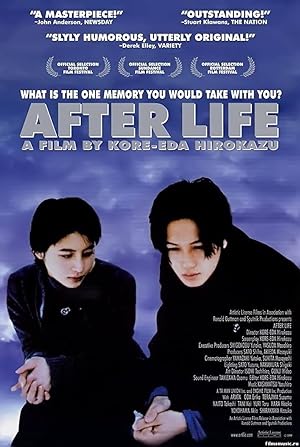After Life is a movie about eight days in a way station for recently deceased people to prepare to transition to the next stage. After Life is equal parts drama and documentary as it mixes fact and fiction, actual memories and a script, to flesh out an extremely focused narrative. After Life is one of Hirokazu Koreeda’s earlier films and is probably one of my least favorites because it is a transitional piece from his work as a TV to a film director when only judged with the rest of his films, but if compared to all films, After Life is as strong as and reminiscent of Wim Wenders’ Wings of Desire in its realistic approach to the fantasy genre.
After Life captures the viewer’s attention in various ways by using two overarching stories that sustain your attention throughout the film and telling multiple stories of the dead. The first overarching story that After Life presents is a new concept of the afterlife. You will watch the film closely to understand how this world works. The second overarching story is about the staff. After Life makes you curious about who they are and why they work there because the majority of the time, the film only shows the staff working and listening, not discussing his or her life. After Life makes you ask yourself what your response would be in this situation.
After Life is a love letter to movies and television and depicts the different roles that media play in our lives. Television is rooted in daily life, a primary document in the annals of personal history whereas film has the power to transform us and help us transcend our temporal boundaries. After Life borrows heavily from the “hey, let’s put on a show” trope in order to save people’s souls. After Life celebrates the creative process and the consumption of media, but Koreeda’s idea of the pearly gates is particularly intriguing: it is a collaboration and conversation of souls who create and consume. The lines blur so fully that often those souls are exchanging roles or doing both simultaneously.
After Life’s premise reveals why Koreeda’s films are so masterful. He does not see himself as an auteur with special gifts above the masses, but as a skilled man with a solemn, respectful duty to represent real life and real people by learning as much from them as he can and in turn giving them something beautiful to transform them into a different state of being. Even though After Life is a fantasy movie, it is autobiographical for Koreeda.
While I enjoyed After Life, I found myself less engaged as the film unfolded and shifted from the interviews to the production stage. After Life did surprise me because I did not anticipate how the stories would connect. I have no idea what the significance is, but I was fascinated that the more junior the counselor, the more fascinated the counselor was with snow or how attached they still were to life.
I would recommend After Life to long time Koreeda fans or people who enjoy realistic fantasy dramas with the caveat that there are subtitles. After Life is a difficult film to find so I would suggest seeing if your library has it.
Stay In The Know
Join my mailing list to get updates about recent reviews, upcoming speaking engagements, and film news.





